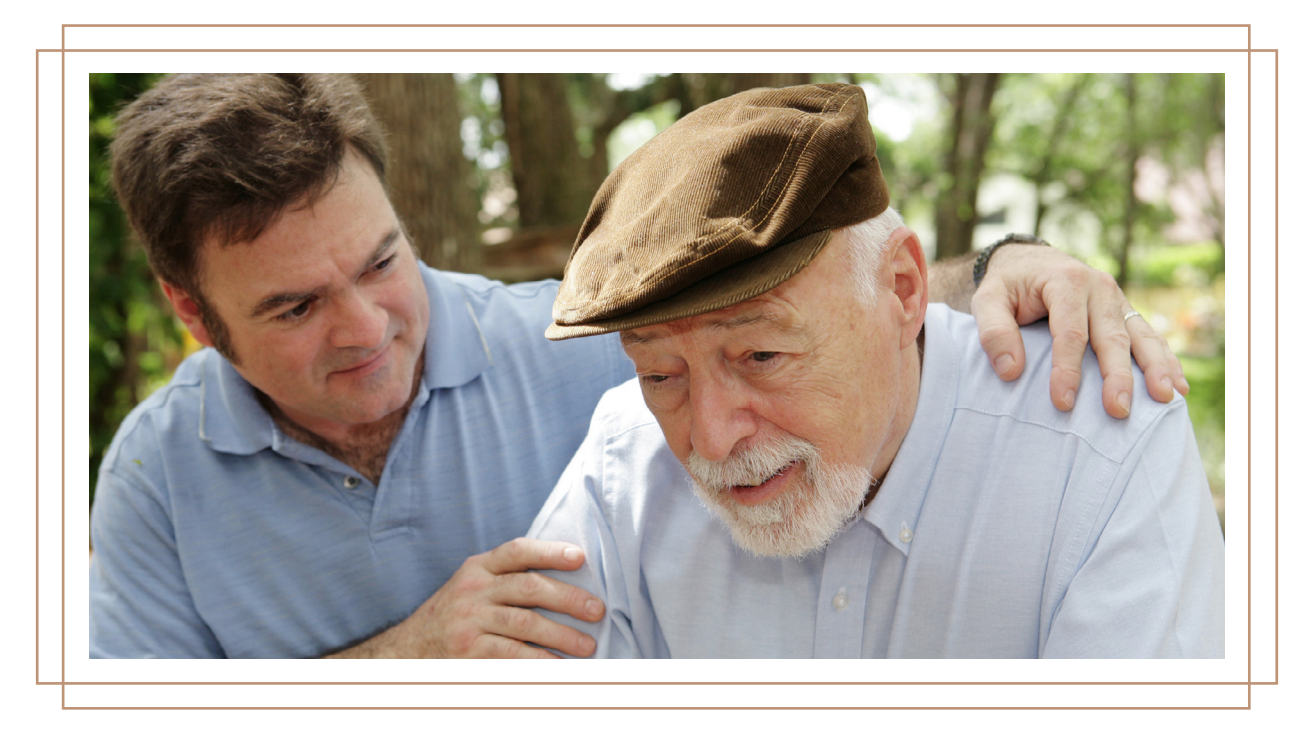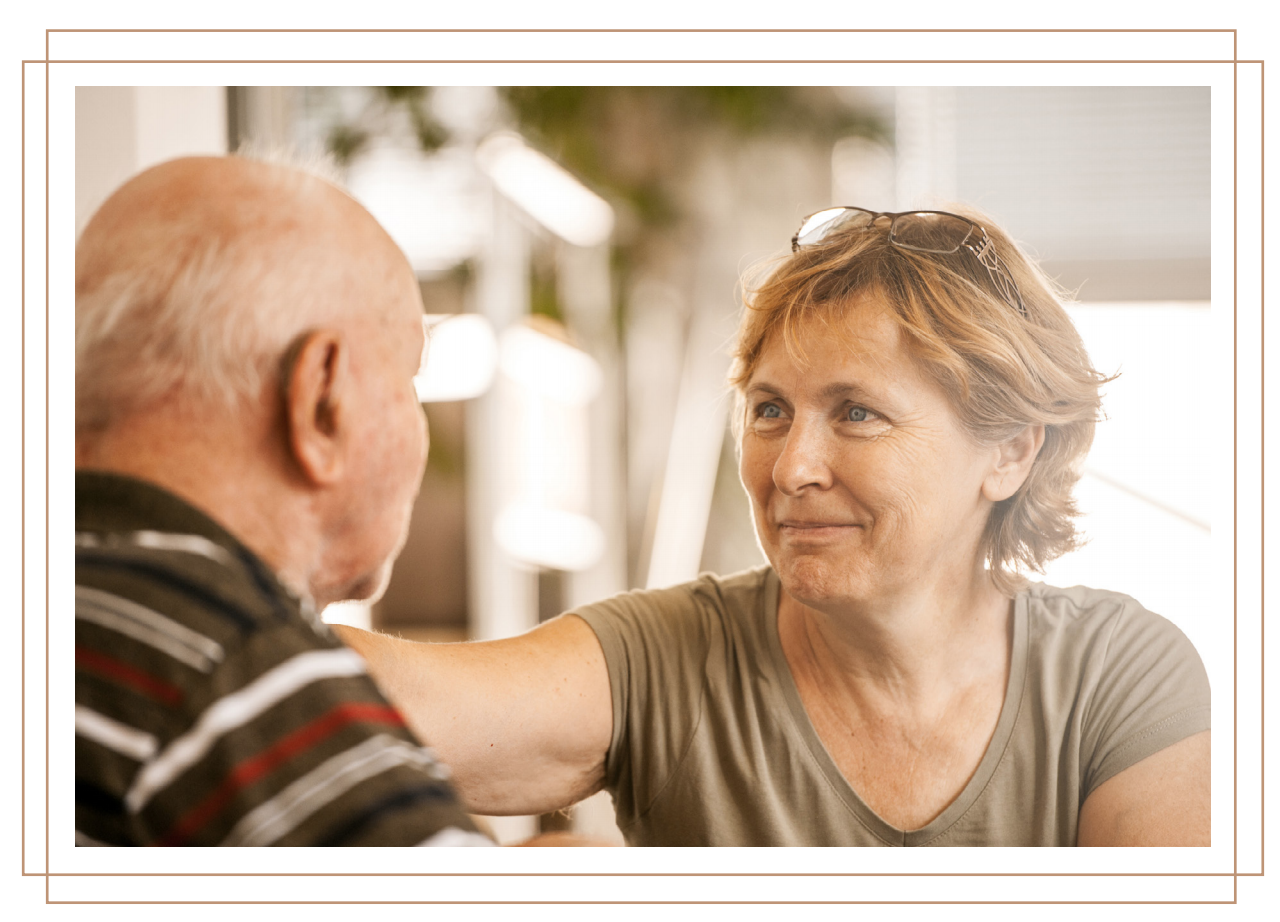When you become a family caregiver, there are a lot of emotions that are bound to surface, from fear of all the things that “might” happen while being a caregiver to tiredness because you cannot fall asleep while worrying about the many stressors that come with being a caregiver. If there is one emotion that nearly anyone caring for an aging loved one can count on, it is guilt.
Caregivers often burden themselves with a long list of self-imposed oughts, shoulds, and musts. Some days you feel guilty because you want your responsibilities as a caregiver to end. Other days you feel guilty because you think you are not doing a good enough job as a caregiver. Every day you ask yourself if caregiving has to feel like this.
Fortunately, the answer is no. Caregiving does not have to be a guilt-ridden experience.

Guilt is a feeling of having done wrong or failed in an obligation. It is a part of the human experience, and it will be part of your caregiving experience. However, it does not have to take over the entire experience.
Instead of beating yourself up over faults that are imagined, unavoidable, or simply human, consider that no one is perfect 24/7, that you are doing the best that you can at a job you have no training for, and that it is OK if there is a discrepancy between what you think you should do and what you are willing and able to do.
In this guide, you will learn about:
Guilt is a complex emotion. One of the sad emotions — which also includes agony, grief, and loneliness — guilt is an emotion people experience because they are convinced that they have caused harm or are responsible for someone else’s misfortune, whether this is the case or not.
When it comes to emotional health, there is no such thing as a good or bad feeling. Emotions, including guilt, live in the most primitive part of the brain — the one that has been around the longest and has evolved to help people make choices to stay safe in the world. They serve a purpose. Even guilt.
For example, if your feeling of guilt stems from a belief that is realistic and helps you move toward your goals in life, it can be incredibly helpful. Think of it as your body’s way of saying, “Pay attention.” A little guilt can help you be more sensitive and attentive.
However, guilt is a complicated emotion.
The problem occurs when you mistakenly suffer under the illusion that you have caused other people harm, when you misinterpret what happens, and when you do not question the logic of your conclusions. Sometimes known as “false guilt” or “disproportionate guilt,” this type of guilt only makes you even harder on yourself than you already are, which is not helpful to anyone.
For example, if your feeling of guilt is based on some unsustainable belief that you should be perfect all the time, then it is probably eating you up without helping you decide how it is best for you to handle a given situation.
Guilt is an ever-present emotion for many family caregivers for a variety of reasons — and they are usually all related to having a false or disproportionate sense of responsibility for anything that goes wrong, such as:
Caregivers often magnify what they have done, take personal responsibility for everything that goes wrong, “should” themselves instead of understanding themselves, and unrealistically expect themselves to only have positive feelings.
According to a State of Caregiving report, nearly one-quarter of adult children who are caring for an aging loved one grapple with guilt multiple times a day. Sons and daughters are also more likely to subscribe to the belief that they are the only ones who can take care of their loved one properly.
This could be a contributing factor behind why adult children experience caregiver guilt. If you believe you are the only one who can take care of your loved ones properly, you are more likely to take on too much caregiving responsibility and then feel undeserved guilt when you become overwhelmed.
It helps to examine the ideas that underlie your guilt and consider whether they make sense to you. The American Institute of Stress offers a Guilt Test, which you can use to determine if you are experiencing false guilt or proper guilt.
First, identify something you feel bad about. Then, determine a percentage for your intention of causing the event, your contribution to it, the amount of control you had over it, and the degree to which it was bad:

You cannot live a completely guilt-free life, so there is no such thing as entirely guilt-free caregiving, either. However, you can keep your feelings of guilt within manageable bounds.
Research shows that addressing an emotion directly is much more effective than just ignoring it. It is normal to feel guilt from time to time, so once you recognize it, you are much better able to deal with it. Actually reflecting on what you are feeling will be much more helpful than sticking a note to your mirror that reads, “Let go of guilt today!”
Start by examining the ideas that underlie your guilt and consider whether they make sense to you. For example, ask yourself: “Would this idea of how I should be in the world make sense to someone who cares about me? Do I expect other people to live up to this same standard, or am I only applying it to myself?”
If you still find yourself condemning yourself rather than placing responsibility where it is due, here are seven ways to cope with caregiver guilt.
Instead of beating yourself up, cut yourself some slack. Consider changing “I feel guilty because” to:
If you act from a place of undeserved guilt, you start to grow resentful. Instead of trying to satisfy all the demands of work, family, and everything else while also saying yes every time your mom begs you to stay longer or come to visit more often, practice saying no.
Set boundaries so that your parent’s expectations are reasonable — and so the time you spend together is as meaningful as possible. Get mealtime conversations going. Share memories with your loved one. Express love to your parents. Especially as the roles shift from dependent child to more of a family caregiver role, you can ensure that your parents feel valued and loved no matter what.
You may feel guilty when you take time for yourself, but the truth is, the only way to sustain the love and care you feel your loved one deserves is to take good care of yourself as well. Remember to give yourself permission to breathe, take some time, and focus on some self-care.
Respite stays offer the caregiver a short-term break from the emotionally stressful job of caregiving while their loved one continues to receive the care they need in a safe environment.
Respite care can take many forms and settings; however, a short-term respite stay in assisted living is beneficial for your loved one, especially if you want your aging parent to get more comfortable with the idea of moving to a senior living community. A respite stay offers them the opportunity to interact with other seniors having similar experiences, to spend time in a safe, supportive environment, and to participate in activities designed to match personal abilities and needs. Just like you need a break from your routine, a short-term respite stay in assisted living allows your loved one to have a break and provides a little extra excitement.
Patience typically wears thin when you are worn out and exhausted. If you feel like you are reaching the end of your rope, use that as a warning sign that you need to take a break. It is important to care for yourself and make sure you are getting enough rest so you can be at your best for your loved one. Put your energy into finding time for a break rather than dwelling on feelings of guilt.
If you tend to hide emotions you feel are negative, it can be both stressful and dangerous to your health. Negative emotions such as guilt are as natural as emotions such as joy and love, and you have a right to feel how you feel. It is important that you have a safe outlet for those emotions.
Whether you vent to a friend, diffuse your anger through exercise, find a secluded place to have a good cry, or join a support group, it is important to care for yourself and make sure you access caregiving resources to better manage the emotional ups and downs of caring for an aging loved one.
As caregivers, you need to pay attention to your guilt and what it is telling you. If you feel guilty because you wanted to do something but you did not, you can change your behaviors.
For example, you might feel guilty if your loved one is in the hospital and you did not send a card. Channel that guilt and let it propel you to buy some beautiful blank cards to make it easier to drop a note the next time.
Because your intentions are good but your time, resources, and skills are limited, you are just going to feel guilty sometimes — so try to get comfortable with that gap between perfection and reality instead of beating yourself up over it. Accept that you are human and have flaws. Recognize your strengths and do not focus on the negative.
Remind yourself that you can be a better caregiver to your loved one when you get enough rest, eat healthy meals, and have a chance to attend to your own needs. All that love and kindness you have for your care recipient — give some to yourself. You are doing the best you can. And that is OK.
If you think that one day you will be faced with relocating your loved one to an assisted living community, the best way to address the situation is to anticipate it. Make decisions with your parents while they are still at a place to make such decisions.
Visiting assisted living facilities with your parents early is one definite method to keep them in the loop. This allows your parents to remain the decision-makers and can reduce any guilt you are feeling about the role reversal. Making an informed decision about assisted living is a potentially huge step toward alleviating guilt.

Liz O’Donnell — a full-time employee, mom, and family caregiver — stopped the cycle of guilt she was in by eliminating the word “should” from her vocabulary. On her blog WorkingDaughter. com13, she outlines an exercise she recommends to fellow family caregivers who need to overcome harmful caregiver guilt. “Don’t think about this exercise too much,” O’Donnell says. “Just start writing.”
For example, in the left-hand column, you might write something like, “I should take my father grocery shopping every weekend.” That “should” may have a match on the right that looks like, “I want to help my father stay healthy and live as independently as possible.”
Do you really need to take over running your father’s house? Of course not. Perhaps siblings can help. Maybe home health care is an option. Or you can order groceries online or have meals delivered a few days a week. Act on what you want to do to help, not what you think you should do.
If you live an hour or more away from a person who needs care, you are a long-distance caregiver. Long-distance caregivers often struggle with making sure they understand the needs of the care receiver while often feeling guilty about living so far away from those they are caring for: Am I visiting, calling, doing enough?
Long-distance caregiving can take many forms. From afar, you might:
What is often overlooked is the stress of guilt that often accompanies not being physically present to spend time with, comfort, and care for those you love. Here are some tips to help you manage long-distance caregiver guilt.
Living just one hour away from an aging loved one can make caregiving more difficult and complex. According to a study by the National Alliance for Caregiving, more than 40 percent of long-distance caregivers have to rearrange work schedules, many miss work regularly, and most spend a significant amount of time traveling back and forth. Even when you are giving your all, it is easy to feel as if you are not doing enough. This is where long-distance caregiver guilt can rear its ugly head.
Acceptance is key. Know what your strengths are as a long-distance caregiver, and accept that there are real limits to what you can do from afar. You may not be able to visit your loved one regularly, but you can call, arrange a video chat, write, or find other personal ways to show you care.
When you are able to visit your loved one, your inclination might be to come with a to-do list big enough to need its own suitcase. Pack lighter than that. Talk to your loved one and their caregiver ahead of time. Figure out the top item or two they would like your help with. Come with one or two items of your own.
Then focus on love, not duty. Remember that more important than any task on your list is actually spending time visiting. Staying connected to family helps improve everyone’s sense of well-being, and that sense of well-being will help alleviate any thoughts of guilt that can often drive a deeper wedge between you and your parent.
If a sibling or another loved one lives close by and handles most of the caregiving, your guilt may be multiplied. Perhaps your sibling is resentful of your distance or maybe you truly long to be closer and more helpful. Support the primary caregiver with words of encouragement, a listening ear, and financial support if possible. Do not let guilt prevent you from reaching out with loving support.
Technology is one of the best ways to remain linked from afar. Smartphones and tablets with Wi-Fi capability allow for FaceTiming and Skyping and being able to “see” each other, even if not in person.
If a source of your long-distance caregiver guilt is that you cannot be as hands-on with medical care as you would like, there is a wide selection of smart devices designed to help the elderly and their caregivers:
Continue to maintain a positive outlook by doing your best and reminding yourself that all you do goes beyond duty. It is a labor of love and care. When you do all you can for your loved one, you should not feel guilty about doing your best. Take a moment to reflect on those victories.
Additionally, encourage your parents to remain as independent as possible, too. Not having someone there to make every decision, cook every meal, and handle all of life’s duties can actually foster much-needed independence.
For the tasks that cannot be achieved alone safely, you may need to enlist the help of others. If you have family who can help with some duties, ask for help. If this is not an option, you may have to hire in-home help or seek respite care.
Do not forget to take care of yourself. Talk with close friends, siblings, and other family members about your feelings, find a caregiver support group, or get professional help if you are overwhelmed.

A common question older adults ask is, “Why would I move out of my house?” They equate living in their home with freedom, independence, and happiness because that is how they have always felt about it. Their question assumes that staying in one’s home will always convey those virtues.
However, when caring for them at home becomes dangerous or nearly impossible, it is absolutely necessary to move them to a place where they can get the care they need. Even if this is the best decision for their health and for yours, the guilt and sadness can still be overwhelming.
If you are struggling with a decision to place your loved one in an assisted living community:
Fortunately, research shows that moving into an assisted living community comes with quality-of-life advantages that, often, living at home cannot match. They also offer health benefits that could prolong health.
Here is a look at three common reasons family caregivers feel guilty about moving their parents to assisted living and why you can stop feeling guilty about them.
Whether you promised Mom you would always take care of her or your dad asked you to never abandon him, sometimes moving someone to assisted living means that you are taking care of them by getting them the level of care they need.
Moving to assisted living does not mean your loved one is abandoned, either. You can still spend as much time with them as you can, talk frequently with the care partners and team members, and manage their overall care. You are taking good care of your aging loved one, and you certainly have not abandoned them.
How often do you compare yourself to others or beat yourself up for things that are out of your control? Just because your friend takes care of her mom at home does not mean you should be able to, too.
Everyone’s situation is different. Your loved one may have more serious health conditions or need a much higher level of care than is possible for you to provide. If your health is suffering or if someone could get injured, it is time to make a change.
Moving your loved one to assisted living protects both of your health and safety and allows them to get the care they need. Besides, if you do not protect your own health, you surely will not be able to keep caring for them.
Putting anyone into a new environment can be an uncomfortable and even distressing experience. Suddenly, you are asking your parents to form new acquaintances, trust new professional care partners, navigate new schedules, and acclimate to new environments.
However, these are exactly the benefits of assisted living. In assisted living, residents can easily socialize with peers, not only in common areas but also through planned, structured activities like field trips, dancing, and cultural events. Residents can enjoy a fine-dining experience every day of the week. Laundry and housekeeping services are typically provided, which means your parent will have more time to take part in a wide variety of activities that are generally offered on-site or on excursions or day trips off-site.
By helping your loved one plan ahead for long-term care, you can avoid the stress and regret of hasty decisions and put him or her in a well-chosen senior living arrangement. Not only will you still be part of the care team, but you will also get to be their son or daughter or husband or wife again. You will still be your loved one’s advocate, just not their full-time caregiver.
For now, you will give much of your attention and your life to help them. Just do not give it all. Accept and respect reality. A commitment also to some life of your own will make you a more refreshed caregiver and protect against caregiver burnout. That’s a winning situation for both sides.
